#julie hoag
Explore tagged Tumblr posts
Text
In the midst of an unseasonal California heat wave last late spring, Nathaniel DeNicola, an obstetrician-gynecologist at Hoag Hospital in Newport Beach, had an unusual case on his hands: A patient who had been carrying a perfectly healthy pregnancy for 32 weeks was going into early labor. It didn’t make sense; nevertheless, the baby was coming. The patient’s waters had broken, the baby’s heartbeat was dropping fast, and the child was in the breech position. The mother had an emergency C-section. After spending a couple of weeks in the neonatal intensive care unit, the baby was allowed to go home.
After the scramble to deliver the baby, DeNicola searched for reasons that might explain the premature arrival. Sometimes there are obvious causes for the early rupturing of membranes, like a chlamydia infection or a condition called cervical insufficiency, in which the cervix starts to dilate on its own. But those explanations didn’t fit DeNicola’s patient. Struggling, he settled on a different explanation: the searing heat. “I can’t prove that that was because of extreme heat; it’s very tough to assign that,” he says. But from his research, he knew that heat can trigger preterm births. And in his 12 years as a clinician, he has often seen more obstetric emergency visits during heatwaves.
Doctors have known for some time that certain groups of people, like the elderly and children, are particularly vulnerable to heatwaves. But in recent years, a new population has come into focus: pregnant people and their unborn babies. As the world warms up, there is a growing corpus of evidence that the heat is interfering with pregnancy, perturbing the delicate fetus in the womb, with the potential for serious complications.
And it’s plenty hot now. July 3 was the hottest day ever recorded globally. July was declared the hottest month on record. California’s Death Valley recently reached 128 degrees Fahrenheit—just two degrees short of a record for the entire planet. In Phoenix, Arizona, the daytime temperature hasn’t dipped below 110 degrees Fahrenheit in almost a month. In parts of the world, such as Iran, the heat index is teetering toward the threshold of what the human body can tolerate. Swathes of Europe are on fire.
Understanding the effect of extreme heat on pregnancies will require a major shift. Due to ethical concerns, pregnant people have typically been excluded from studies of the effects of heat on physiology. (A recent paper drily pointed out that far more research has been done on the effects of heat stress on livestock “due to its economic importance.”) It means that much of what we know comes from animal studies.
So far, there are many theories, but not many firm conclusions. Animal studies have shown that heat can provoke an increase in the secretion of oxytocin, a key hormone involved in labor, which may also explain the phenomenon in humans. It could be that extreme heat triggers the premature rupture of membranes, leading to a too-early birth. Or it could be that heat strain causes the release of inflammatory proteins, prompting preterm labor. Maybe it’s dehydration caused by the heat, causing the release of prostaglandins, lipids that will trigger contractions, and these contractions can be so intense that the body goes into early labor.
In pregnant people, we know that the body alters the way it regulates its temperature to accommodate for increased body size and the metabolic toil required to grow a baby. This, in turn, limits the body’s capacity to dissipate heat. So when it’s super hot, a pregnant person is perhaps less equipped to deal with the heat. Another theory is that when a pregnant person is experiencing heat stress, the body releases heat-shock proteins, which could trigger physiological reactions that are harmful to the baby and its bearer.
A few papers have tried to pinpoint how heat affects the development of human babies, notably a 2022 study that followed 92 pregnant farmers working in The Gambia in West Africa. Led by Ana Bonell, a research fellow at the London School of Hygiene & Tropical Medicine, the team wanted to figure out how doing agricultural labor out in the heat was affecting their pregnancies. Bonell knew that heat stress can trigger the release of cortisol, which could hinder blood flow to the placenta. So her team decided to measure stress, both on the mother and the fetus. Alarmingly, they saw that for every 1 degree Celsius increase, there was a 17 percent increase in fetal stress—defined as abnormally high heart rate or slower blood flow through the umbilical cord. Overall, they concluded that heat strain on the mother translated into strain on the fetus.
Bonell felt it was important to be doing the research in a region likely to face some of the worst tolls of a heating world, where the typical escapes—say, retreating to an air-conditioned building—aren’t available to all. “There’s a massive inequality and climate justice agenda that goes with any research around climate change,” she says. “West Africa is one of the most vulnerable to the impacts of climate change. It just felt right, really.”
Strain on the fetus can have serious consequences. Multiple studies have found that even small increases in ambient temperature can increase the risk of preterm birth: A study from California found that for every 5.6 degrees Celsius increase in ambient temperature exposure, the risk of a preterm birth increased by 8.6 percent. Another analysis also found that the risk of preterm birth increased as temperatures went up.
Several studies have also found significant links between heat exposure and low birth weight. A 2022 study conducted in Massachusetts found that higher ambient temperature resulted in smaller babies. One reason why, the paper proposes, is that perhaps the induced heat-shock proteins mess up normal protein synthesis, which may wreak havoc with the development of the fetus’s organs.
For some babies, the heat can prove fatal. Another recent analysis led by Bonell reviewed the link between heat exposure and stillbirths: One study from Western Australia found that the risk of stillbirth increased by 41 percent if the mother was exposed to moderate heat stress—around 32 degrees Celsius—in the last two weeks of pregnancy.
And hot weather may affect a baby’s development in other ways: A 2021 analysis found a higher incidence of anomalies, such as cardiac defects, spina bifida, or cleft lip, at higher temperatures. A 2019 study took existing research that linked heat exposure to congenital heart defects and extrapolated how many such cases we can expect in the coming years: The authors estimated that over an 11-year period, an additional 7,000 babies will be born with congenital heart defects in the eight US states they studied. According to Bonell, there’s also early evidence from animals that heat stress may be triggering epigenetic changes linked to long-term adult chronic diseases such as heart disease and diabetes.
And in the United States, any potential harm to a fetus brings with it other concerns. Pregnant people, more than ever in a post-Roe world, are at risk of criminalization for behavior that may harm the fetus, particularly in states that recognize fetal personhood, which grants legal rights to a fetus from conception. “You might live in a state that criminalizes your adverse birth outcome because you took a walk when it was hot, or you were working outdoors when the temperatures were too high,” says Adelle Dora Monteblanco, an assistant professor of public health at Pacific University in Oregon.
As the research linking extreme heat to pregnancy complications piles up, public health bodies, including the World Health Organization and UNICEF, have started to take notice and include pregnant people and their unborn babies in warnings during extreme heat—although some, like the United Kingdom, are still leaving pregnant people out. While including pregnant people in public health messaging is important, doctors also need to do more to keep patients fully informed on how to stay safe. “We know enough to act,” says DeNicola. “While we don’t have perfect solutions, we do have counseling we can give.” He knows to tell his patients to drink more water, and try to access any kind of cooling, if they have the means. If air-conditioning isn’t an option at home, people should look for cooling centers, or shopping malls, movie theaters, or libraries.
Research has shown that more targeted advice is still a necessity. A 2022 paper concluded that current guidance for pregnant people with regard to heat exposure is “sparse, inconsistent, and not evidence based.” Big questions remain, like at what stage in the pregnancy is the mother and fetus most at risk, or at what temperature conditions shift from risky to dangerous.
Yet there are limits to simply giving out advice. As the world heats up, pregnant people and their babies will continue to be vulnerable to these risks—particularly people from low-income households and people of color. Bonell points out that what people really need is practical help or the tools to help themselves. “You need some other solutions that aren’t just about education,” she says.
11 notes
·
View notes
Text

"STORMS MAY BE PARDONED," Kingston Daily Standard. July 6, 1912. Page 2. --- To be at the Bedside of Sick Wife. ----- Department of Justice Has Been Petitioned - Six Children Temporarily Orphaned. --- His wife at death's door in the General Hospital, his six children fatherless and motherless around the city, the case of Thomas Storms, sentenced to one year for being implicated in the Carson robbery, has been brought before the Department of Justice by Mayor Hoag and Sheriff Dawson, and a conditional pardon is daily expected, to allow the prisoner to be at the bedside of his wife, whose recovery from a serious attack of typhoid-pneumonia, is doubtful.
The county jail was the scene of a pathetic incident Friday at noon, when Storm's aged mother, sobbing ceaselessly, asked that her son be allowed to go to where his wife was supposed to be dying. Sheriff Dawson at once authorized his removal to the hospital. The meeting of husband and wife was a pathetic one. After a short time together, Storms was taken back to the jail. But the effect of the reunion to the wife was like a tonic, and this morning the doctors announce that she still has a chance to recover. Freedom for her husband, it is thought, might bring about a complete recovery.
The request to the Department is supplemented by petition, to which is affixed the name of R. J. Carson.
#kingston ontario#robbery#criminal conspiracy#compassionate release#pardon#conditional release#frontenac county jail#dying wife#bedside vigil#crime and punishment in canada#history of crime and punishment in canada
0 notes
Text

Dean Curtis Stalnaker was born July 9, 1963, in Norfolk to Maurice and Edith (Piwenitzky) Stalnaker. He grew up on the family farm and attended elementary school in Hadar. He graduated from Norfolk Senior High School in 1981 and Bob Jones University in 1985. With his degree in English education, he taught high school English in Limerick, Pa., for five years. For the next five years, he worked for the Resolution Trust Corp., dealing with failed savings and loans companies nationwide.
In 1995, he relocated to the Denver area, working for several law firms as a paralegal, mainly with real estate and water rights. He was also involved in music ministry at several churches, lastly at Calvary Presbyterian in Denver and Calvary Church in Golden.
He was diagnosed with glioblastoma, an aggressive brain cancer in September 2021.
He is survived by his mother; his sister, Joleen of Norfolk; sister-in-law Valerie Stalnaker of Leesburg, Va.; a niece, Kelly (Andrew) Hoag of Leesburg, Va.; a nephew, Alexander (Brandi) Stalnaker of Fredericksburg, Va.; and four great-nieces. He was preceded in death by his father in 2016 and brother Tom in 2001.
His management skills and attention to detail served his employers well. He brought glory to God and joy to the congregations with his music ministry.
#Bob Jones University#BJU Hall of Fame#2023#Obituary#BJU Alumni Association#Dean Curtis Stalnaker#Class of 1985
0 notes
Text
oh that’s so pretty!
Here’s mine:

On July 9th, 2001
Hoag’s Object
a nearly perfect ring of hot, blue stars pinwheels about the yellow nucleus of an unusual galaxy known as ‘Hoag’s Object’.
Tags:
@wayward-sherlock @finalgirlkaspbrak @sorry-i-panicked @adorewillbyers @significant-ace-nnoyance + anyone else who wants to!
Since it’s Hubbles birthday tomorrow :D (the day it officially launched aka April 24) I THOUGHT IT WOULD BE CUTE TO SHARE THE PHOTOS HUBBLE TOOK ON OUR BIRTHDAYS!
This is mine!

It’s a galaxy cluster (so basically a bunch of galaxies) and you can see that it’s gravitational pull is so strong it bends light (which is very cool to me ngl MAJSKANAJ)
Here’s the link if anyone else wanted to do it to!
No pressure tags—
@moonlightmarvey @daydreams-in-the-moonlight @kaleidoskuls @ohfallingdisco @emblazons @howtobecomeadragon @unprofessionalprofessional @l0v3c0r3e @geeky--glasses @foodiewithdahoodie @will80sbyers @twodoorsnotone @wheelerssecret + anyone who wants to!!
348 notes
·
View notes
Link
#jd robb#maya banks#julie garwood#nora roberts#jasinda wilder#debbie macomber#tami hoag#linda lael miller#book reviews#satire
0 notes
Text
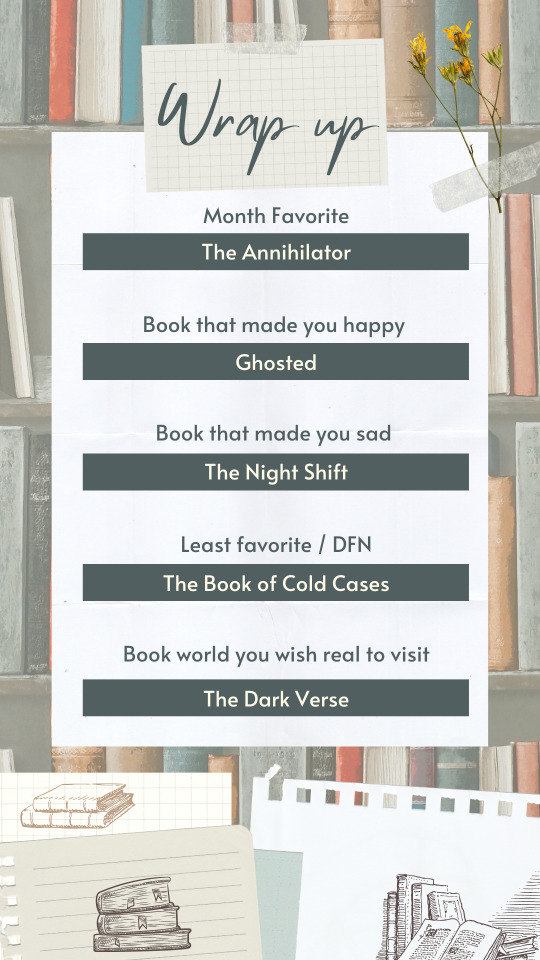

#july wrap up#july reads#jm darhower#runyx#riley sager#lynn painter#winter renshaw#alex finlay#tami hoag
0 notes
Text
a year in books: 2022 book tracking master post
january: 8 books
murder is for keeps: elizabeth j. duncan
the art of theft: sherry thomas
murder on cold street: sherry thomas
the tell tale cat: sm reine
the cure for what ales you: ellie alexander
to brew or not to brew: joyce tremel
grandmaster of demonic cultivation: mo xiang tong xiu
this poison heart: kalynn bayron
february: 11 books
cells at work: code black vol 1: shigemitsu harada
cells at work: code black vol 2: shigemitsu harada
cells at work code black vol 3: shigmeitsu harada
caught bread handed: ellie alexander
cells at work code black vol 4: shigemitsu harada
a crime of passion fruit: ellie alexander
caught bread handed: ellie alexander
a deadly edition: victoria gilbert
rocky road to ruin: meri allen
renewed for murder: victoria gilbert
meet your baker: ellie alexander
march: 8 books
a batter of life and death: ellie alexander
on thin icing: ellie alexander
fudge and jury: ellie alexander
another one bites the crust: ellie alexander
till death do us tart: ellie alexander
live and let pie: ellie alexander
a cup of holiday fear: ellie alexander
nothing bundt trouble: ellie alexander
april: 11 books
chilled to the cone ellie alexander
the deepest of secrets kelley armstong
stealing shadows kay hooper
mocha she wrote ellie alexander
bake, borrow, and steal ellie alexander
mile high with a vampire lynsay sands
out of the shadows kay hooper
slice of cherry dia reeves
cinderlla is dead kalynn bayron
immortal rising lynsay sands
the detetive's daughter erica spindler
may: 19 books
drawing dead sm reine
kill game sm reine
cashing out sm reine
suicide queen sm reine
the masque of the red cat sm reine
fall of the house of cat sm reine
the cat and the pendulum sm reine
the silence of bones june hur
the forest of stolen girls june hur
the red palace june hur
dragon pearl yoon ha lee
wicked fox kat cho
spirit hunters ellen oh
vicious spirits kat cho
aunt dimity down under nancy atherton
aunt dimity and the duke nancy atherton
aunt dimity's christmas nancy atherton
aunt dimity beats the devil nancy atherton
aunt dimity: detective nancy atherton
june: 9 books
booked for death victoria gilbert
daughter of the pirate king tricia levenseller
daughters of foxcote manor eve chase
wherever she goes kelley armstrong
when you see me lisa gardner
a good girl's guide to murder holly jackson
good girl, bad blood holly jackson
as good as dead holly jackson
something read, something dead eva gates
july: 16 books
graceling kristin cashore
bitterblue kristin cashore
fire kristin cashore
winterkeep kristin cashore
one of us is lying karen m mcmanus
the seven husbands of evelyn hugo taylor jenkins reid
one of us is next karen m mcmanus
you'll be the death of me karen m mcmanus
two can keep a secret karen m mcmanus
the cousins karen m mcmanus
murder for the modern girl kendall kulper
one for sorrow zoe sugg, amy mcculloch
a magic steeped in poison judy i lin
graceling: the graphic novel kristen cashore garreth hinds
deeper than the dead tami hoag
the inheritance games jennifer lynn barnes
august: 17 books
the hawthorne legacy jennifer lynn barnes
little girl lost cheryl bradshaw
the fixer's daughter hy conrad
this wicked fate kalynn bayron
i'm glad my mom died jennette mccurdy
the family upstairs lisa jewell
little girl lost brian mcgilloway
the girl is murder kathryn miller
the demon in me michelle rowen
a short time to die susan alice bickford
little broken things cheryl bradshaw
little lost secrets cheryl bradshaw
little white lies cheryl bradshaw
mayhem & mass olivia matthews
peril & prayer olivia matthews
learning to swim sara j. henry
the missing ones patricia gibney
september: 4 books
in the hall with the knife diana peterfreund
in the study with the wrench diana peterfreund
in the ballroom with the candlestick diana peterfreund
the death of innocents helen prejean
october: 8 books
don't kill in our names rachel king
the zig zag girl elly griffiths
smoke and mirrors elly griffiths
the blood card elly griffiths
the vanishing box elly griffiths
now you see them elly griffiths
the midnight hour elly griffiths
dead man walking helen prejean
6 notes
·
View notes
Photo

HOAG'S OBJECT This unusual extragalactic object was discovered in 1950 by astronomer Art Hoag. Hoag’s Object is about 120,000 light years across and is about 600 million light years distant, towards the constellation of Serpens.
The ring on the outside is dominated by young bright blue stars, and surrounds a yellow nucleus dominated by older redder stars, the galaxy Hoag’s Object. There is a gap between the two that is almost completely dark, though it may contain some star clusters too faint to see. It is unknown how this object formed, though similar objects have been identified and labelled as a form of ring galaxy. Theories as to its formation include a galaxy collision billions of years ago or perturbative gravitational interactions involving an unusually shaped core.
The image was taken in July 2001 by the Wide Field and Planetary Camera 2. At about one o’clock within the gap another ring galaxy is visible. -TEL http://hubblesite.org/newscenter/archive/releases/2002/21/image/a/ Image credit: R. Lucas (STScI/AURA), Hubble Heritage Team, NASA
28 notes
·
View notes
Photo
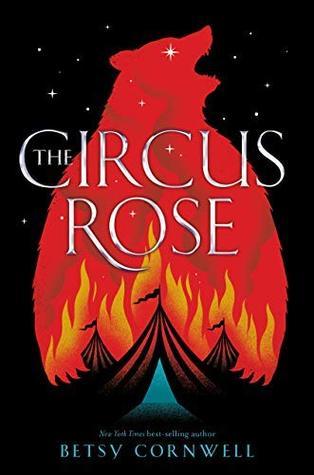
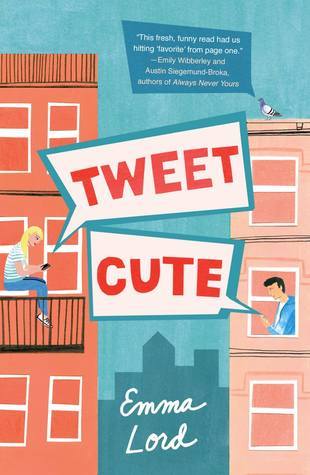
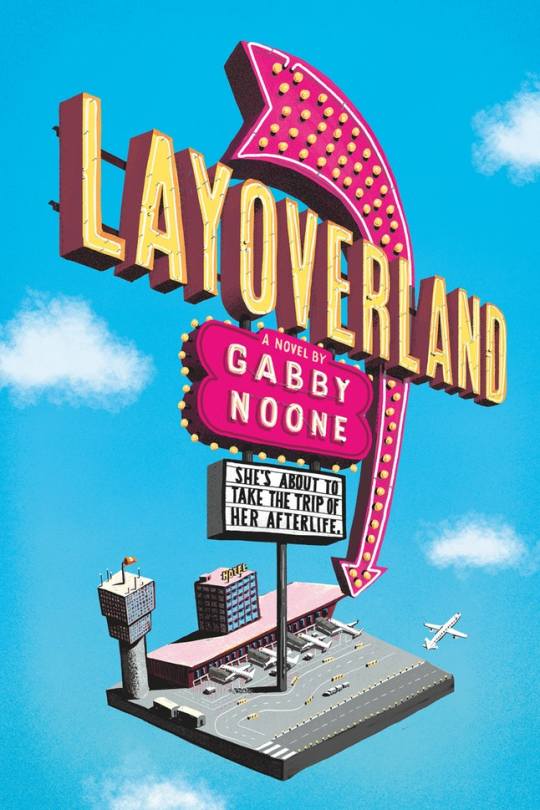
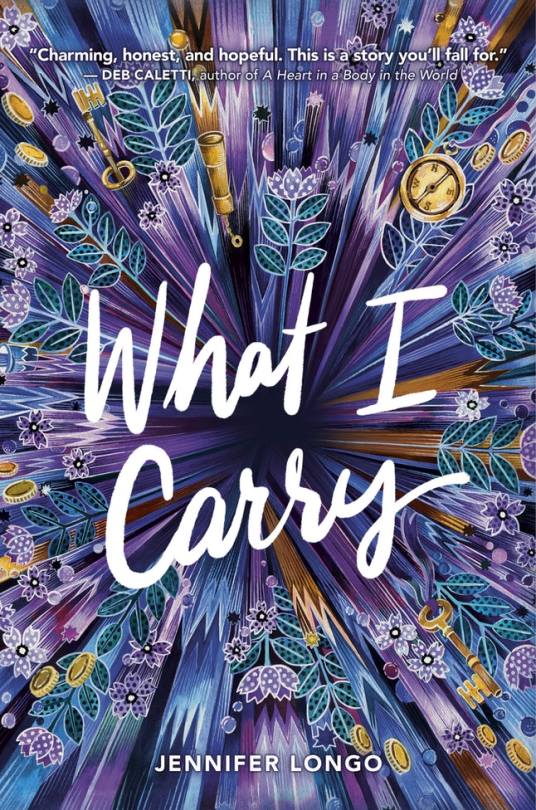
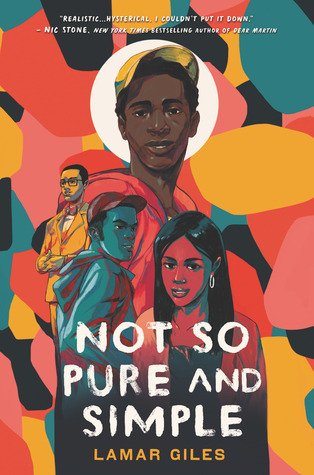




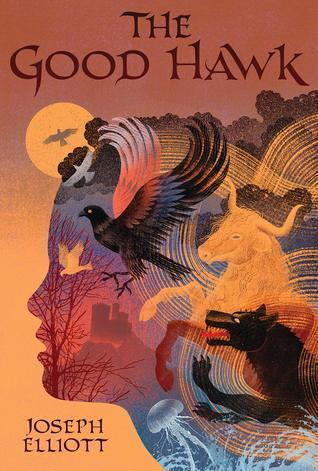
New Young Adult Releases Coming Out Today! (January 21st, 2020) ___
Have I missed any new Young Adult releases? Have you added any of these books to your TBR? Let me know! ___
New Standalones/First in a Series:
The Circus Rose by Betsy Cornwell
Tweet Cute by Emma Lord
Layoverland by gabby Noone
What I Carry by Jennifer Longo
Not So Pure & Simple by Lamar Giles
Gone by Nightfall by Dee Garretson
Wardens of Eternity by Courtney Allison Moulton
Ashlords by Scott Reintgen
Rogue Princess by B.R. Myers
The Good Hawk by Joseph Elliott
Spellhacker by M.K. England
Hungry Hearts by Julie Hoag
___
New Sequels:
The Hand on the Wall (Truly Devious #3) by Maureen Johnson
This Vicious Cure (This Mortal Coil #3) by Emily Suvada
The Iron Will of Genie Lo (The Epic Crush of Genie Lo #2) by F.C. Yee
Devil Darling Spy (Orphan Monster Spy #2) by Matt Killeen
Off Script (Seeking Mansfield #3) by Kate Watson
___
Happy reading!
#books#bookish#booklr#bookworm#book blog#book blogger#Features#new releases#new books#on books#on reading#tbr#to-read#january 2020#2020#yalit#yareads#young adult#book list#long text post#kate watson#matt killeen#f.c. yee#emily suvada#maureen johnson#julie hoag#m.k. england#joseph elliott#b.r. myers#scott reintgen
97 notes
·
View notes
Text
A Return from Hiatus
2022.05.10
Hey, I’m back! A lot, and I mean a lottttt has happened since I’ve last wrote here . I obviously can’t write about all of it, but to recap:
_____
2018
1) Finished my last year in Incheon at Soojung Vision School and came to LA around April.
2) Went on an extended vacation with my family: Jeju Island, Singapore, Hong Kong, and Malaysia (not in order).
3) Leased a 430i Gran Coupe and started working for my dad.
4) Played badminton and met a cool fella named Edward Sarang Kim who became my partner and ultimately met 브엘이 through him!
5) Had one of the most adventurous Christmas season events with Diana. Shoutouts to Santos, Haemin, Joohee, and Santos’ cousins in San Diego.
_____
2019
1) Went on an epic Vegas trip with family and friends (Diana, Santos, and Haemin). Hakkasanㅋㅋㅋㅋㅋㅋㅋㅋ
2) Decided to get married to 브엘이 Feb 15. 2019 legally at a court wedding in Downtown Fullerton, and had our wedding ceremony at Good Steward’s Church on October 12, 2019.
3) Moved into 8095 Page in May, 2019!
4) Honeymoon to Hawaii (Oahu and Maui)
_____
2020
1) Covid-19 begins - what a fiasco.
2) Korea trip in May / June? Begin playing golf seriously starting in July, 2020.
3) Purchase a Model 3 in July.
_____
2021
1) Stocks go freaking crazy. So does Crypto. I lose in the end. Sad life....
2) We find out we are pregnant around February 2021!!!!
3) 201 14th St. Georgina project. Extremely tough and daunting project, but a great experience.
4) Ellia Kwak is born September 28, 2021 @ Hoag Hospital.
5) Covid is still rampant. Delta Variant and the impending Omicron Variant.
_____
2022
1) Being new parents kicks our BUTT’s. Diana struggles immensely.
2) Start therapy sessions due to marital issues between the two of us. Therapy reveals a lot of trauma and issues that I haven’t faced because I didn’t realize these things growing up.
3) Diana and I get OMICRON and Ellia doesn’t. She has super powers, I swear... ㅋㅋㅋㅋㅋ
4) Parents buy a place in Korea, a small apartment next to 분당. They vacation in Korea and Diana and Ellia go first. I join them and am currently here in 오포
0 notes
Text
COVID rise in pregnant women cues new warnings
COVID rise in pregnant women cues new warnings
Image Source Officials are warning about increasing numbers of pregnant women becoming infected with the coronavirus and being hospitalized. Los Angeles County reported 81 cases of coronavirus infections among pregnant women for the week that ended July 25, triple the rate from the last full week of June. And at Hoag Hospital in Newport Beach, doctors are now seeing a higher proportion of…

View On WordPress
0 notes
Text
Love Like Fiction Go Pop
Love Like Fiction have just gone pop with their incredible cover of a Harry Styles Watermelon Sugar. Produced by Bob Hoag (The Ataris, The Maine, The Format, Gin Blossoms) at Flying Blanket Recording, this cover is the follow up to the band’s single “Misery Maintenance” released earlier this year. The cover will be available tomorrow November 6th.
Love Like Fiction recently did a livestream performance at the Craig Ranch Amphitheater in Las Vegas for the i-Voted Festival, the largest single night digital concert in history, alongside artists such as Taking Back Sunday, 3OH!3, ANBERLIN, Young the Giant, and hundreds of others.
The band selected covering “Watermelon Sugar” as “a heartfelt letter penned to all who have struggled this year. We really believe that it is extremely important that we all do our best to help keep people’s spirits up in such difficult times.
Leading up to their anticipated EP ‘New Nostalgia’ releasing mid-2021, Love Like Fiction will be doing a special in-studio recording session live-streamed on The Recording Artist (Amazon Prime) on November 11th as well as live-streaming at Last Exit Live on November 20th for KWSS 93.9 FM 15 Year Anniversary Show.
Based in Phoenix, AZ, Alt Pop-Punk band Love Like Fiction is the brainchild of Tara Goltz (Drums) and Marin Bridges (Guitar) who brought the band together in July of 2018 by recruiting Nick Barker (Lead Vocals), Frankie Stapley (Guitar and Vocals), and Paul Ritchie (Bass). Drawing inspiration from bands like Panic! At the Disco, New Found Glory and Mayday Parade, Love Like Fiction’s sound is upbeat and poppy with a melancholic undertone.
The band has also racked up an impressive list of notable support slots, in a short amount of time, sharing the stage with the likes of Sum 41, Bayside, IDKHOW & SWMRS. Support from Spotify’s Crash Course and New Punk Tracks playlist has further bolstered the quintet’s exposure within the alternative scene.
Check out their Spotify:
For fans of; Grayscale, Mayday Parade, Fall Out Boy, Stand Atlantic, Hellogoodbye, Silverstein, My Chemical Romance, All Time Low.
Love Like Fiction Go Pop was originally published on The Pop Punk Days
#2020#Arizona#cover#harry styles#Love Like Fiction#Phoenix#pop punk#ppd#punk goes pop#The Pop Punk Days#Watermelon sugar#xsparkage#the pop punk days#theppd
0 notes
Text
New story in Technology from Time: Facebook’s Ties to India’s Ruling Party Complicate Its Fight Against Hate Speech
In July 2019, Alaphia Zoyab was on a video call with Facebook employees in India, discussing some 180 posts by users in the country that Avaaz, the watchdog group where she worked, said violated Facebook’s hate speech rules. But half way through the hour-long meeting, Shivnath Thukral, the most senior Facebook official on the call, got up and walked out of the room, Zoyab says, saying he had other important things to do.
Among the posts was one by Shiladitya Dev, a lawmaker in the state of Assam for Prime Minister Narendra Modi’s Hindu nationalist Bharatiya Janata Party (BJP). He had shared a news report about a girl being allegedly drugged and raped by a Muslim man, and added his own comment: “This is how Bangladeshi Muslims target our [native people] in 2019.” But rather than removing it, Facebook allowed the post to remain online for more than a year after the meeting, until TIME contacted Facebook to ask about it on Aug. 21. “We looked into this when Avaaz first flagged it to us, and our records show that we assessed it as a hate speech violation,” Facebook said in a statement to TIME. “We failed to remove upon initial review, which was a mistake on our part.”
Thukral was Facebook’s public policy director for India and South Asia at the time. Part of his job was lobbying the Indian government, but he was also involved in discussions about how to act when posts by politicians were flagged as hate speech by moderators, former employees tell TIME. Facebook acknowledges that Thukral left the meeting, but says he never intended to stay for its entirety, and joined only to introduce Zoyab, whom he knew from a past job, to his team. “Shivnath did not leave because the issues were not important,” Facebook said in the statement, noting that the company took action on 70 of the 180 posts presented during the meeting.
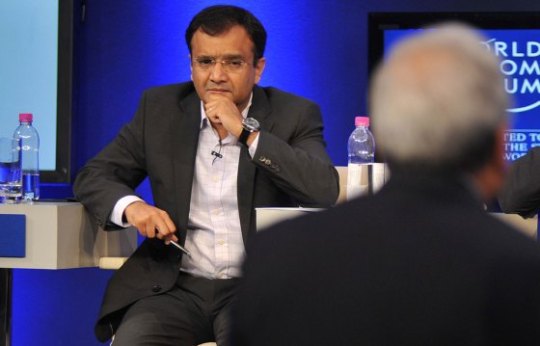
Eric Miller—World Economic ForumShivnath Thukral at the Moving to Better Ground session during the India Economic Summit in Mumbai, November, 2011.
The social media giant is under increasing scrutiny for how it enforces its hate speech policies when the accused are members of Modi’s ruling party. Activists say some Facebook policy officials are too close to the BJP, and accuse the company of putting its relationship with the government ahead of its stated mission of removing hate speech from its platform—especially when ruling-party politicians are involved. Thukral, for instance, worked with party leadership to assist in the BJP’s 2014 election campaign, according to documents TIME has seen.
Facebook’s managing director for India, Ajit Mohan, denied suggestions that the company had displayed bias toward the BJP in an Aug. 21 blog post titled, “We are open, transparent and non-partisan.” He wrote: “Despite hailing from diverse political affiliations and backgrounds, [our employees] perform their respective duties and interpret our policies in a fair and non-partisan way. The decisions around content escalations are not made unilaterally by just one person; rather, they are inclusive of views from different teams and disciplines within the company.”
Facebook published the blog post after the Wall Street Journal, citing current and former Facebook employees, reported on Aug.14 that the company’s top policy official in India, Ankhi Das, pushed back against other Facebook employees who wanted to label a BJP politician a “dangerous individual” and ban him from the platform after he called for Muslim immigrants to be shot. Das argued that punishing the state lawmaker, T. Raja Singh, would hurt Facebook’s business prospects in India, the Journal reported. (Facebook said Das’s intervention was not the sole reason Singh was not banned, and that it was still deciding if a ban was necessary.)
Read more: Can the World’s Largest Democracy Endure Another Five Years of a Modi Government?
Those business prospects are sizeable. India is Facebook’s largest market, with 328 million using the social media platform. Some 400 million Indians also use Facebook’s messaging service WhatsApp — a substantial chunk of the country’s estimated 503 million internet users. The platforms have become increasingly important in Indian politics; after the 2014 elections, Das published an op-ed arguing that Modi had won because of the way he leveraged Facebook in his campaign.
But Facebook and WhatsApp have also been used to spread hate speech and misinformation that have been blamed for helping to incite deadly attacks on minority groups amid rising communal tensions across India—despite the company’s efforts to crack down. In February, a video of a speech by BJP politician Kapil Mishra was uploaded to Facebook, in which he told police that unless they removed mostly-Muslim protesters occupying a road in Delhi, his supporters would do it themselves. Violent riots erupted within hours. (In that case, Facebook determined the video violated its rules on incitement to violence and removed it.)
WhatsApp, too, has been used with deadly intent in India — for example by cow vigilantes, Hindu mobs that have attacked Muslims and Dalits accused of killing cows, an animal sacred in Hinduism. At least 44 people, most of them Muslims, were killed by cow vigilantes between May 2015 and December 2018, according to Human Rights Watch. Many cow vigilante murders happen after rumors spread on WhatsApp, and videos of lynchings and beatings are often shared via the app too.
Read more: How the Pandemic is Reshaping India
TIME has learned that Facebook, in an effort to evaluate its role in spreading hate speech and incitements to violence, has commissioned an independent report on its impact on human rights in India. Work on the India audit, previously unreported, began before the Journal published its story. It is being conducted by the U.S. law firm Foley Hoag and will include interviews with senior Facebook staff and members of civil society in India, according to three people with knowledge of the matter and an email seen by TIME. (A similar report on Myanmar, released in 2018, detailed Facebook’s failings on hate speech that contributed to the Rohingya genocide there the previous year.) Facebook declined to confirm the report.
But activists, who have spent years monitoring and reporting hate speech by Hindu nationalists, tell TIME that they believe Facebook has been reluctant to police posts by members and supporters of the BJP because it doesn’t want to pick fights with the government that controls its largest market. The way the company is structured exacerbates the problem, analysts and former employees say, because the same people responsible for managing the relationship with the government also contribute to decisions on whether politicians should be punished for hate speech.
“A core problem at Facebook is that one policy org is responsible for both the rules of the platform and keeping governments happy,” Alex Stamos, Facebook’s former chief security officer, tweeted in May. “Local policy heads are generally pulled from the ruling political party and are rarely drawn from disadvantaged ethnic groups, religious creeds or castes. This naturally bends decision-making towards the powerful.”
Some activists have grown so frustrated with the Facebook India policy team that they’ve begun to bypass it entirely in reporting hate speech. Following the call when Thukral walked out, Avaaz decided to begin reporting hate speech directly to Facebook’s company headquarters in Menlo Park, Calif. “We found Facebook India’s attitude utterly flippant, callous, uninterested,” says Zoyab, who has since left Avaaz. Another group that regularly reports hate speech against minorities on Facebook in India, which asked not to be named out of fear for the safety of its staffers, said it has been doing the same since 2018. In a statement, Facebook acknowledged some groups that regularly flag hate speech in India are in contact with Facebook headquarters, but said that did not change the criteria by which posts were judged to be against its rules.
Read more: Facebook Says It’s Removing More Hate Speech Than Ever Before. But There’s a Catch
The revelations in the Journal set off a political scandal in India, with opposition politicians calling for Facebook to be officially investigated for alleged favoritism toward Modi’s party. And the news caused strife within the company too: In an internal open letter, Facebook employees called on executives to denounce “anti-Muslim bigotry” and do more to ensure hate speech rules are applied consistently across the platform, Reuters reported. The letter alleges that there are no Muslim employees on the India policy team; in response to questions from TIME, Facebook said it was legally prohibited from collecting such data.
Facebook friends in high places
While it is common for companies to hire lobbyists with connections to political parties, activists say the history of staff on Facebook’s India policy team, as well as their incentive to keep the government happy, creates a conflict of interest when it comes to policing hate speech by politicians. Before joining Facebook, Thukral had worked in the past on behalf of the BJP. Despite this, he was involved in making decisions about how to deal with politicians’ posts that moderators flagged as violations of hate speech rules during the 2019 elections, the former employees tell TIME. His Facebook likes include a page called “I Support Narendra Modi.”
Former Facebook employees tell TIME they believe a key reason Thukral was hired in 2017 was because he was seen as close to the ruling party. In 2013, during the BJP’s eventually successful campaign to win national power at the 2014 elections, Thukral worked with senior party officials to help run a pro-BJP website and Facebook page. The site, called Mera Bharosa (“My Trust” in Hindi) also hosted events, including a project aimed at getting students to sign up to vote, according to interviews with people involved and documents seen by TIME. A student who volunteered for a Mera Bharosa project told TIME he had no idea it was an operation run in coordination with the BJP, and that he believed he was working for a non-partisan voter registration campaign. According to the documents, this was a calculated strategy to hide the true intent of the organization. By early 2014, the site changed its name to “Modi Bharosa” (meaning “Modi Trust”) and began sharing more overtly pro-BJP content. It is not clear whether Thukral was still working with the site at that time.
In a statement to TIME, Facebook acknowledged Thukral had worked on behalf of Mera Bharosa, but denied his past work presented a conflict of interest because multiple people are involved in significant decisions about removing content. “We are aware that some of our employees have supported various campaigns in the past both in India and elsewhere in the world,” Facebook said as part of a statement issued to TIME in response to a detailed series of questions. “Our understanding is that Shivnath’s volunteering at the time focused on the themes of governance within India and are not related to the content questions you have raised.”
Now, Thukral has an even bigger job. In March 2020, he was promoted from his job at Facebook to become WhatsApp’s India public policy director. In the role, New Delhi tech policy experts tell TIME, one of Thukral’s key responsibilities is managing the company’s relationship with the Modi government. It’s a crucial job, because Facebook is trying to turn the messaging app into a digital payments processor — a lucrative idea potentially worth billions of dollars.
In April, Facebook announced it would pay $5.7 billion for a 10% stake in Reliance Jio, India’s biggest telecoms company, which is owned by India’s richest man, Mukesh Ambani. On a call with investors in May, Facebook CEO Mark Zuckerberg spoke enthusiastically about the business opportunity. “With so many people in India engaging through WhatsApp, we just think this is going to be a huge opportunity for us to provide a better commerce experience for people, to help small businesses and the economy there, and to build a really big business ourselves over time,” he said, talking about plans to link WhatsApp Pay with Jio’s vast network of small businesses across India. “That’s why I think it really makes sense for us to invest deeply in India.”
Read more: How Whatsapp Is Fueling Fake News Ahead of India’s Elections
But WhatsApp’s future as a payments application in India depends on final approval from the national payments regulator, which is still pending. Facebook’s hopes for expansion in India have been quashed by a national regulator before, in 2016, when the country’s telecoms watchdog said Free Basics, Facebook’s plan to provide free Internet access for only some sites, including its own, violated net neutrality rules. One of Thukral’s priorities in his new role is ensuring that a similar problem doesn’t strike down Facebook’s big ambitions for WhatsApp Pay.
‘No foreign company in India wants to be in the government’s bad books’
While the regulator is technically independent, analysts say that Facebook’s new relationship with the wealthiest man in India will likely make it much easier to gain approval for WhatsApp Pay. “It would be easier now for Facebook to get that approval, with Ambani on its side,” says Neil Shah, vice president of Counterpoint Research, an industry analysis firm. And goodwill from the government itself is important too, analysts say. “No foreign company in India wants to be in the government’s bad books,” says James Crabtree, author of The Billionaire Raj. “Facebook would very much like to have good relations with the government of India and is likely to think twice about doing things that will antagonize them.”
The Indian government has shown before it is not afraid to squash the dreams of foreign tech firms. In July, after a geopolitical spat with China, it banned dozens of Chinese apps including TikTok and WeChat. “There has been a creeping move toward a kind of digital protectionism in India,” Crabtree says. “So in the back of Facebook’s mind is the fact that the government could easily turn against foreign tech companies in general, and Facebook in particular, especially if they’re seen to be singling out major politicians.”
With hundreds of millions of users already in India, and hundreds of millions more who don’t have smartphones yet but might in the near future, Facebook has an incentive to avoid that possibility. “Facebook has said in the past that it has no business interest in allowing hate speech on its platform,” says Chinmayi Arun, a resident fellow at Yale Law School, who studies the regulation of tech platforms. “It’s evident from what’s going on in India that this is not entirely true.”
Facebook says it is working hard to combat hate speech. “We want to make it clear that we denounce hate in any form,” said Mohan, Facebook’s managing director in India, in his Aug. 21 blog post. “We have removed and will continue to remove content posted by public figures in India when it violates our Community Standards.”
But scrubbing hate speech remains a daunting challenge for Facebook. At an employee meeting in June, Zuckerberg highlighted Mishra’s February speech ahead of the Delhi riots, without naming him, as a clear example of a post that should be removed. The original video of Mishra’s speech was taken down shortly after it was uploaded. But another version of the video, with more than 5,600 views and a long list of supportive comments underneath, remained online for six months until TIME flagged it to Facebook in August.
from Blogger https://ift.tt/3b4nKgL via IFTTT
0 notes
Link
In July 2019, Alaphia Zoyab was on a video call with Facebook employees in India, discussing some 180 posts by users in the country that Avaaz, the watchdog group where she worked, said violated Facebook’s hate speech rules. But half way through the hour-long meeting, Shivnath Thukral, the most senior Facebook official on the call, got up and walked out of the room, Zoyab says, saying he had other important things to do.
Among the posts was one by Shiladitya Dev, a lawmaker in the state of Assam for Prime Minister Narendra Modi’s Hindu nationalist Bharatiya Janata Party (BJP). He had shared a news report about a girl being allegedly drugged and raped by a Muslim man, and added his own comment: “This is how Bangladeshi Muslims target our [native people] in 2019.” But rather than removing it, Facebook allowed the post to remain online for more than a year after the meeting, until TIME contacted Facebook to ask about it on Aug. 21. “We looked into this when Avaaz first flagged it to us, and our records show that we assessed it as a hate speech violation,” Facebook said in a statement to TIME. “We failed to remove upon initial review, which was a mistake on our part.”
Thukral was Facebook’s public policy director for India and South Asia at the time. Part of his job was lobbying the Indian government, but he was also involved in discussions about how to act when posts by politicians were flagged as hate speech by moderators, former employees tell TIME. Facebook acknowledges that Thukral left the meeting, but says he never intended to stay for its entirety, and joined only to introduce Zoyab, whom he knew from a past job, to his team. “Shivnath did not leave because the issues were not important,” Facebook said in the statement, noting that the company took action on 70 of the 180 posts presented during the meeting.
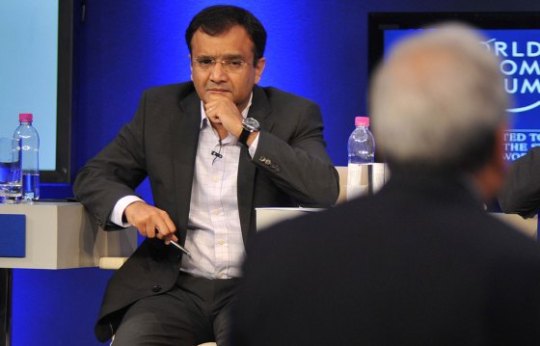
Eric Miller—World Economic ForumShivnath Thukral at the Moving to Better Ground session during the India Economic Summit in Mumbai, November, 2011.
The social media giant is under increasing scrutiny for how it enforces its hate speech policies when the accused are members of Modi’s ruling party. Activists say some Facebook policy officials are too close to the BJP, and accuse the company of putting its relationship with the government ahead of its stated mission of removing hate speech from its platform—especially when ruling-party politicians are involved. Thukral, for instance, worked with party leadership to assist in the BJP’s 2014 election campaign, according to documents TIME has seen.
Facebook’s managing director for India, Ajit Mohan, denied suggestions that the company had displayed bias toward the BJP in an Aug. 21 blog post titled, “We are open, transparent and non-partisan.” He wrote: “Despite hailing from diverse political affiliations and backgrounds, [our employees] perform their respective duties and interpret our policies in a fair and non-partisan way. The decisions around content escalations are not made unilaterally by just one person; rather, they are inclusive of views from different teams and disciplines within the company.”
Facebook published the blog post after the Wall Street Journal, citing current and former Facebook employees, reported on Aug.14 that the company’s top policy official in India, Ankhi Das, pushed back against other Facebook employees who wanted to label a BJP politician a “dangerous individual” and ban him from the platform after he called for Muslim immigrants to be shot. Das argued that punishing the state lawmaker, T. Raja Singh, would hurt Facebook’s business prospects in India, the Journal reported. (Facebook said Das’s intervention was not the sole reason Singh was not banned, and that it was still deciding if a ban was necessary.)
Read more: Can the World’s Largest Democracy Endure Another Five Years of a Modi Government?
Those business prospects are sizeable. India is Facebook’s largest market, with 328 million using the social media platform. Some 400 million Indians also use Facebook’s messaging service WhatsApp — a substantial chunk of the country’s estimated 503 million internet users. The platforms have become increasingly important in Indian politics; after the 2014 elections, Das published an op-ed arguing that Modi had won because of the way he leveraged Facebook in his campaign.
But Facebook and WhatsApp have also been used to spread hate speech and misinformation that have been blamed for helping to incite deadly attacks on minority groups amid rising communal tensions across India—despite the company’s efforts to crack down. In February, a video of a speech by BJP politician Kapil Mishra was uploaded to Facebook, in which he told police that unless they removed mostly-Muslim protesters occupying a road in Delhi, his supporters would do it themselves. Violent riots erupted within hours. (In that case, Facebook determined the video violated its rules on incitement to violence and removed it.)
WhatsApp, too, has been used with deadly intent in India — for example by cow vigilantes, Hindu mobs that have attacked Muslims and Dalits accused of killing cows, an animal sacred in Hinduism. At least 44 people, most of them Muslims, were killed by cow vigilantes between May 2015 and December 2018, according to Human Rights Watch. Many cow vigilante murders happen after rumors spread on WhatsApp, and videos of lynchings and beatings are often shared via the app too.
Read more: How the Pandemic is Reshaping India
TIME has learned that Facebook, in an effort to evaluate its role in spreading hate speech and incitements to violence, has commissioned an independent report on its impact on human rights in India. Work on the India audit, previously unreported, began before the Journal published its story. It is being conducted by the U.S. law firm Foley Hoag and will include interviews with senior Facebook staff and members of civil society in India, according to three people with knowledge of the matter and an email seen by TIME. (A similar report on Myanmar, released in 2018, detailed Facebook’s failings on hate speech that contributed to the Rohingya genocide there the previous year.) Facebook declined to confirm the report.
But activists, who have spent years monitoring and reporting hate speech by Hindu nationalists, tell TIME that they believe Facebook has been reluctant to police posts by members and supporters of the BJP because it doesn’t want to pick fights with the government that controls its largest market. The way the company is structured exacerbates the problem, analysts and former employees say, because the same people responsible for managing the relationship with the government also contribute to decisions on whether politicians should be punished for hate speech.
“A core problem at Facebook is that one policy org is responsible for both the rules of the platform and keeping governments happy,” Alex Stamos, Facebook’s former chief security officer, tweeted in May. “Local policy heads are generally pulled from the ruling political party and are rarely drawn from disadvantaged ethnic groups, religious creeds or castes. This naturally bends decision-making towards the powerful.”
Some activists have grown so frustrated with the Facebook India policy team that they’ve begun to bypass it entirely in reporting hate speech. Following the call when Thukral walked out, Avaaz decided to begin reporting hate speech directly to Facebook’s company headquarters in Menlo Park, Calif. “We found Facebook India’s attitude utterly flippant, callous, uninterested,” says Zoyab, who has since left Avaaz. Another group that regularly reports hate speech against minorities on Facebook in India, which asked not to be named out of fear for the safety of its staffers, said it has been doing the same since 2018. In a statement, Facebook acknowledged some groups that regularly flag hate speech in India are in contact with Facebook headquarters, but said that did not change the criteria by which posts were judged to be against its rules.
Read more: Facebook Says It’s Removing More Hate Speech Than Ever Before. But There’s a Catch
The revelations in the Journal set off a political scandal in India, with opposition politicians calling for Facebook to be officially investigated for alleged favoritism toward Modi’s party. And the news caused strife within the company too: In an internal open letter, Facebook employees called on executives to denounce “anti-Muslim bigotry” and do more to ensure hate speech rules are applied consistently across the platform, Reuters reported. The letter alleges that there are no Muslim employees on the India policy team; in response to questions from TIME, Facebook said it was legally prohibited from collecting such data.
Facebook friends in high places
While it is common for companies to hire lobbyists with connections to political parties, activists say the history of staff on Facebook’s India policy team, as well as their incentive to keep the government happy, creates a conflict of interest when it comes to policing hate speech by politicians. Before joining Facebook, Thukral had worked in the past on behalf of the BJP. Despite this, he was involved in making decisions about how to deal with politicians’ posts that moderators flagged as violations of hate speech rules during the 2019 elections, the former employees tell TIME. His Facebook likes include a page called “I Support Narendra Modi.”
Former Facebook employees tell TIME they believe a key reason Thukral was hired in 2017 was because he was seen as close to the ruling party. In 2013, during the BJP’s eventually successful campaign to win national power at the 2014 elections, Thukral worked with senior party officials to help run a pro-BJP website and Facebook page. The site, called Mera Bharosa (“My Trust” in Hindi) also hosted events, including a project aimed at getting students to sign up to vote, according to interviews with people involved and documents seen by TIME. A student who volunteered for a Mera Bharosa project told TIME he had no idea it was an operation run in coordination with the BJP, and that he believed he was working for a non-partisan voter registration campaign. According to the documents, this was a calculated strategy to hide the true intent of the organization. By early 2014, the site changed its name to “Modi Bharosa” (meaning “Modi Trust”) and began sharing more overtly pro-BJP content. It is not clear whether Thukral was still working with the site at that time.
In a statement to TIME, Facebook acknowledged Thukral had worked on behalf of Mera Bharosa, but denied his past work presented a conflict of interest because multiple people are involved in significant decisions about removing content. “We are aware that some of our employees have supported various campaigns in the past both in India and elsewhere in the world,” Facebook said as part of a statement issued to TIME in response to a detailed series of questions. “Our understanding is that Shivnath’s volunteering at the time focused on the themes of governance within India and are not related to the content questions you have raised.”
Now, Thukral has an even bigger job. In March 2020, he was promoted from his job at Facebook to become WhatsApp’s India public policy director. In the role, New Delhi tech policy experts tell TIME, one of Thukral’s key responsibilities is managing the company’s relationship with the Modi government. It’s a crucial job, because Facebook is trying to turn the messaging app into a digital payments processor — a lucrative idea potentially worth billions of dollars.
In April, Facebook announced it would pay $5.7 billion for a 10% stake in Reliance Jio, India’s biggest telecoms company, which is owned by India’s richest man, Mukesh Ambani. On a call with investors in May, Facebook CEO Mark Zuckerberg spoke enthusiastically about the business opportunity. “With so many people in India engaging through WhatsApp, we just think this is going to be a huge opportunity for us to provide a better commerce experience for people, to help small businesses and the economy there, and to build a really big business ourselves over time,” he said, talking about plans to link WhatsApp Pay with Jio’s vast network of small businesses across India. “That’s why I think it really makes sense for us to invest deeply in India.”
Read more: How Whatsapp Is Fueling Fake News Ahead of India’s Elections
But WhatsApp’s future as a payments application in India depends on final approval from the national payments regulator, which is still pending. Facebook’s hopes for expansion in India have been quashed by a national regulator before, in 2016, when the country’s telecoms watchdog said Free Basics, Facebook’s plan to provide free Internet access for only some sites, including its own, violated net neutrality rules. One of Thukral’s priorities in his new role is ensuring that a similar problem doesn’t strike down Facebook’s big ambitions for WhatsApp Pay.
‘No foreign company in India wants to be in the government’s bad books’
While the regulator is technically independent, analysts say that Facebook’s new relationship with the wealthiest man in India will likely make it much easier to gain approval for WhatsApp Pay. “It would be easier now for Facebook to get that approval, with Ambani on its side,” says Neil Shah, vice president of Counterpoint Research, an industry analysis firm. And goodwill from the government itself is important too, analysts say. “No foreign company in India wants to be in the government’s bad books,” says James Crabtree, author of The Billionaire Raj. “Facebook would very much like to have good relations with the government of India and is likely to think twice about doing things that will antagonize them.”
The Indian government has shown before it is not afraid to squash the dreams of foreign tech firms. In July, after a geopolitical spat with China, it banned dozens of Chinese apps including TikTok and WeChat. “There has been a creeping move toward a kind of digital protectionism in India,” Crabtree says. “So in the back of Facebook’s mind is the fact that the government could easily turn against foreign tech companies in general, and Facebook in particular, especially if they’re seen to be singling out major politicians.”
With hundreds of millions of users already in India, and hundreds of millions more who don’t have smartphones yet but might in the near future, Facebook has an incentive to avoid that possibility. “Facebook has said in the past that it has no business interest in allowing hate speech on its platform,” says Chinmayi Arun, a resident fellow at Yale Law School, who studies the regulation of tech platforms. “It’s evident from what’s going on in India that this is not entirely true.”
Facebook says it is working hard to combat hate speech. “We want to make it clear that we denounce hate in any form,” said Mohan, Facebook’s managing director in India, in his Aug. 21 blog post. “We have removed and will continue to remove content posted by public figures in India when it violates our Community Standards.”
But scrubbing hate speech remains a daunting challenge for Facebook. At an employee meeting in June, Zuckerberg highlighted Mishra’s February speech ahead of the Delhi riots, without naming him, as a clear example of a post that should be removed. The original video of Mishra’s speech was taken down shortly after it was uploaded. But another version of the video, with more than 5,600 views and a long list of supportive comments underneath, remained online for six months until TIME flagged it to Facebook in August.
0 notes
Photo

“This is a part of my life at Hoag Hospital, Newport Beach Time to move on. Long journey in Samsara!” July 31,2020 (at Newport Beach, California) https://www.instagram.com/p/CDVVSkVFtibwKFSooNKq0UP-512LfIJn7lgxrs0/?igshid=w3xc0agcj7tl
0 notes